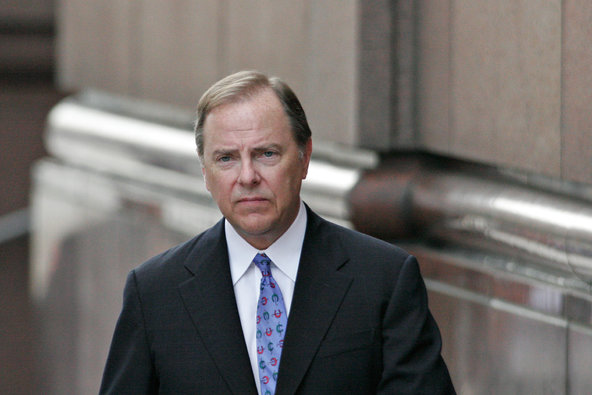 Michael Stravato for The New York TimesJeffrey K. Skilling was convicted on fraud charges in 2006.
Michael Stravato for The New York TimesJeffrey K. Skilling was convicted on fraud charges in 2006.
Jeffrey K. Skilling, the former Enron chief executive serving a 24-year sentence for his role in the fraud that led to the energy giant’s collapse, could be released early from prison under a possible agreement with the government, according to a notice posted late Wednesday on the Justice Department’s Web site.
Lawyers for Mr. Skilling are in talks with prosecutors to reduce the term he was sentenced to for his role in helping to bring down Enron, which before its collapse in 2001 was the world’s largest energy trader and one of America’s most heralded companies.
Related Links
Since his 2006 conviction on fraud and conspiracy charges, Mr. Skilling and his team of lawyers, led by Daniel M. Petrocelli, have waged an aggressive appeal, repeatedly seeking to overturn his conviction on various legal grounds.
Last year, lawyers for Mr. Skilling said that he would seek a new trial based on recently discovered evidence. And a federal appeals court in New Orleans had previously ruled that Mr. Skilling’s sentence should be recalculated because the trial court judge erred in his interpretation of the sentencing guidelines.
The notice of Mr. Skilling’s potential deal with prosecutors was posted to notify victims of Mr. Skilling’s crimes — thousands of former Enron employees and shareholders — of any changes related to his sentence. Victims, who are due restitution of about $50 million, have two weeks to voice objections to a possible new sentence.
“The Department of Justice is considering entering into a sentencing agreement with the defendant in this matter,” reads the notice.
If the government decides to shorten Mr. Skilling’s sentence, it is unclear by how much it would be reduced. Any reduction would also require the approval of Judge Simeon T. Lake III of Federal District Court in Houston, who presided over Mr. Skilling’s trial. (Kenneth Lay, the company’s chairman, was also found guilty but died just over a month after the trial.)
Mr. Skilling and Mr. Lay became public symbols of executive wrongdoing and financial malfeasance after the tech and telecom boom of the late 1990s turned to bust. Enron was at the center of a wave of corporate accounting scandals that emerged after the end of the late 1990s stock market boom. The executives, along with other prominent businessmen like Bernard J. Ebbers of WorldCom and John J. Rigas of Adelphia, were convicted by juries and received lengthy prison terms for lying to investors, employees and government regulators about the health of their companies.
The collapses of Enron and WorldCom punctuated the end of the bull market. President Bush took an aggressive stance on prosecuting white-collar crime, creating a Corporate Fraud Task Force that secured nearly 1,300 corporate fraud convictions, including cases against more than 200 chief executives, company presidents and chief financial officers, according to a 2008 report. Congress passed the Sarbanes-Oxley accounting reform laws.
The Justice Department also formed the Enron Task Force to prosecute crimes specifically connected to the energy company’s bankruptcy, and charged about 30 people connected to the company. Several former Enron executives cooperated with the government and testified at Mr. Lay’s and Mr. Skilling’s trial.
Mr. Skilling’s appeal gained traction with his argument that the government had relied on a dubious legal theory that Mr. Skilling deprived others of his “honest service.” In 2010, the Supreme Court called the use of the awkwardly written “honest services” law unconstitutionally vague and said his conviction was “flawed.”
But a federal appeals court subsequently ruled that the conviction was not tainted by the use of the theory and said there was “overwhelming evidence” that Mr. Skilling had conspired to commit fraud. Last year, the Supreme Court declined to hear Mr. Skilling’s appeal of the appeals court ruling.
But the federal appeals court also reiterated the earlier ruling that Mr. Skilling still needed to have his sentence recalculated. The resentencing was postponed while the broader appeal wended its way through the courts.
Mr. Skilling began serving his sentence at a federal prison in Waseca, Minn., but was moved to another facility in Littleton, Colo., after the Minnesota penitentiary was converted to a women’s prison.
At the time of Mr. Skilling’s sentence, Sean Berkowitz, the director of the Enron Task Force, said the lengthy prison term was appropriate and should serve as a deterrent to corporate fraud.
“‘The Enron fraud is as large and serious as any other fraud in this nation’s history,” he said, adding that because Mr. Skilling “sat at the top and set the culture of what happened at Enron — he should bear the brunt of the responsibility.”
A version of this article appeared in print on 04/05/2013, on page B4 of the NewYork edition with the headline: Lawyers for Enron’s Skilling Are Trying to Reduce His 24-Year Prison Sentence.
Article source: http://dealbook.nytimes.com/2013/04/04/enrons-skilling-could-get-early-prison-release/?partner=rss&emc=rss